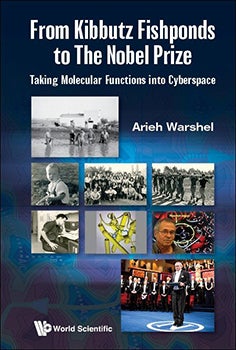
Nobel laureate reveals his odyssey from working the fishponds in a Kibbutz to reaching the pinnacle of science
Not many Nobel laureates can say they were born in a kibbutz and spent time there working the fishponds. But that’s what a young Arieh Warshel did in Kibbutz Sde Nahum in Israel.
He began exploring the technical world by constructing hot air balloons and parachutes in the collective settlement, where all wealth was held in common and kids grew up separated from their parents. That early interest in all things technical eventually would take Warshel to the pinnacle in the field of chemistry.
Warshel shares many personal recollections, as well as his research, in his recently published autobiography, From Kibbutz Fishponds to The Nobel Prize: Taking Molecular Functions into Cyberspace (World Scientific Publishing, 2021).
The 200-page book is Warshel’s second and the first that is not purely scientific. In it, he intertwines personal stories with major milestones in Israeli history and the scientific journey that led to his Nobel Prize.
Warshel, 81, Distinguished Professor of Chemistry, Biochemistry, Chemical Engineering and Materials Science, and Quantitative and Computational Biology, and Dana and David Dornsife Chair in Chemistry, received the Nobel Prize in chemistry in 2013, together with Michael Levitt and Martin Karplus, for pioneering work in computational modeling of biological molecules.
“I felt it was the right time to do it,” Warshel said of spending the last two years tapping out his book on a laptop from a study in his high-rise condominium on the Wilshire Corridor in Los Angeles.
He said of the writing process: “I did not suffer — let’s put it that way. There were parts that I enjoyed, like trying to describe different scientific processes and different fights and struggles.”
Still breaking ground
Warshel’s leading-edge research, beginning in the late 1960s and early ’70s, when computers still were very primitive, led to the development of new pharmaceuticals, among other breakthroughs. Using computers, he created methods and programs that describe the action of biological molecules by “multiscale models.”
And his work at the Warshel Center for Multiscale Simulations at the USC Dornsife College of Letters, Arts and Sciences, continues to break ground today. For example, his team identified variants of COVID-19, including the omicron variant, a month or so before omicron emerged.
Warshel remains an advocate for the growing field of computational science. In April 2017, he opened the Warshel Institute for Computational Biology at the Chinese University of Hong Kong campus in the Shenzhen, China. There, he plans to build one of the world’s most advanced computational biology centers.
Warshel’s autobiography recounts some of the struggles he encountered on his scientific journey as a biochemist and biophysicist.
“I never wrote an important paper that was not rejected first,” he said. “And I’m perhaps the only Nobel laureate whose paper that led to the Nobel Prize was discussed in a promotion process when I was denied tenure.”
That denial, from the Weizmann Institute of Science in Israel, where Warshel earned his master’s and doctoral degrees in chemical physics, led to him accepting a position in the faculty of the Department of Chemistry at USC Dornsife in 1976. He’s been here ever since.
Winning the Nobel Prize remains the highlight of Warshel’s storied career.
“It was unbelievable — really exciting,” said Warshel, who these days continues to conduct research and travel a lot to give lectures to both high school students and major international forums. “The weeklong [Nobel Prize] ceremony in Stockholm was full of unforgettable events.”
The same can be said of Warshel’s life.